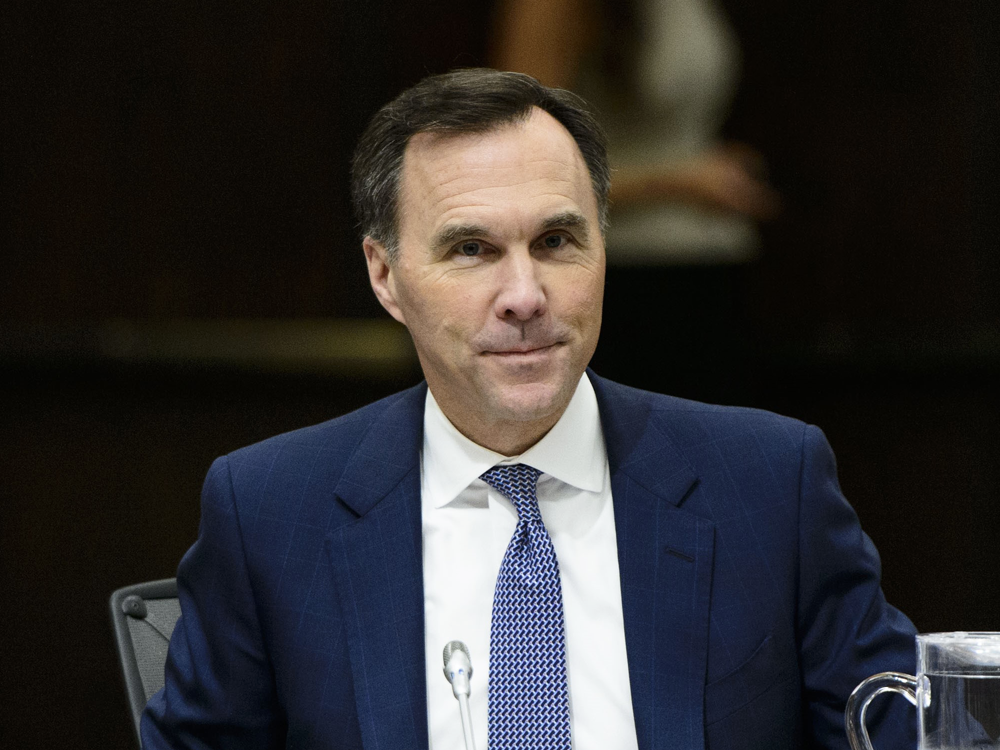Finance Minister Bill Morneau doesn’t want us looking too closely at his latest report card from the International Monetary Fund.
According to a press release from the Finance Department, the minister “welcomed” the fund’s “findings that ‘Canada has employed a judicious mix of policies to support inclusive growth and reduced vulnerabilities in the financial system.’”
Finance noted that the IMF “affirmed” that Canada posted the strongest economic growth in the Group of Seven in 2017, that the jobless rate had fallen to the lowest in 40 years, and that the government had done some things to boost productivity and competitiveness, including tax cuts on business investment. In a statement, Morneau said he was “proud” that the efforts of Prime Minister Justin Trudeau’s government “were being recognized internationally.”
Every year, the IMF sends a team of economists to most of its 189 member countries to assess the state of their economies and the efficacy of their mix of fiscal policy, monetary policy, and financial regulation. On May 21, the fund released the preliminary report of its Canadian team’s latest trip north from their base in Washington. (A lengthy final report will come later.)
It’s true, the IMF graders were generally satisfied with what they saw. But Morneau left out some stuff.
The IMF statement also said this: “Canada faces the challenge of attracting productivity-enhancing investment that both diversifies the economy beyond traditional sectors and takes full advantage of opportunities provided by new trade agreements.”
And this: “With (mortgage restrictions) working well, their effectiveness should not be diluted by home buyer initiatives that inadvertently increase household debt,” a comment that I read as disapproving dig at the sop for first-time homebuyers in Morneau’s latest budget.
Oh, and this: “To enhance its commitment to well-managed public finances, the federal government could explicitly incorporate a fiscal rule.”
Last two: “Growth is expected to slow in the near term” and “risks are tilted to the downside.”
So maybe Morneau has a right to be proud, but the IMF isn’t as taken with his work as Finance makes its sound.
Growth dropped to 1.8 per cent in 2018, a full percentage point slower than the United States, but still the second-fastest in the G7. The IMF predicts Canada’s gross domestic product will advance 1.5 per cent this year, once again second-fastest in the G7 after the U.S.
The outlook is a reminder that Canada’s elected policymakers haven’t been trying hard enough
These numbers are fine. The Bank of Canada estimates the economy can’t grow much faster than 1.5 per cent without causing rapid inflation. The central bank started raising interest rates in 2017 because it worried things were getting out of control. It stopped last fall when the economy hit a wall and nearly stalled.
Still, the outlook is a reminder that Canada’s elected policymakers — federal and provincial, and over a longer period than the last few years — haven’t been trying hard enough.
The central bank’s noninflationary speed limit would be faster if Canada’s productivity growth wasn’t so chronically weak. As the population ages, there will be fewer workers to help generate GDP. So unless those of us left working produce more, wealth will diminish. Economic output has been propped up recently by a surge in immigration, not efficiency and competitiveness. “Current levels of productivity growth are insufficient to sustain long-term growth,” the IMF said.
It might be asking too much to expect Trudeau to have done anything about this in four years. However, he abandoned his promise to balance the budget this year in order to spend tens of billions of dollars on infrastructure that would make the economy more productive. The federal government has struggled to spend the money, in part because provinces and municipalities haven’t always played along. That was predictable and suggests the Trudeau administration put more effort into announcing than it did into administering.
“Challenges in project selection, execution and coordination — especially at the provincial and municipal levels — must be overcome to avoid delays in infrastructure investment,” the IMF said. “A more detailed strategic plan is needed to prioritize infrastructure projects that most serve the long-term national interest.”
The IMF is most discouraged by the Canadian federation’s obsession with doing a trade agreement with Donald Trump instead of pursuing one with itself. There might be no faster way to jolt productivity than to erase the ridiculous barriers to trade that make it easier for an Alberta-based maker of electronic gadgets to sell in Arizona than Ontario. The IMF estimated that internal free trade would boost GDP by almost four per cent. The positive economic shock from the new North American free-trade agreement is an end to uncertainty; initial estimates predict it will have little affect on GDP.
“Like a lot of Canadians, they’re baffled,” Andrea Stairs, who manages eBay Inc.’s Canadian business, said of her bosses’ reaction when told that goods and services don’t move across Canada freely. “We see the impact on small businesses,” she added in an interview. “Being able to connect with buyers across a vast region is a way to accelerate their business and stabilize their business when local conditions go bad.”
Trudeau said he would get serious about internal trade. He did little until last month, when the government introduced legislation that would remove the federal requirement that province-to-province selling of alcohol must go through a provincial liquor authority.
Stairs called it a reasonable start. I can’t help but wonder where we’d be if Trudeau put as much effort into dealing with the premiers as he does with Trump. The IMF’s work suggests we’d be better off if he did.
• Email: kcarmichael@postmedia.com | Twitter: CarmichaelKevin



